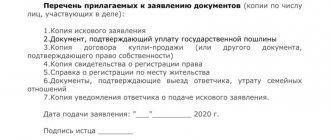Legislation
- The Civil Code of the Russian Federation dated November 30, 1994 No. 54-FZ regulates relations in the field of property, non-property and intellectual rights, property, contractual obligations;
- The Housing Code of the Russian Federation No. 188-FZ establishes quality criteria for the provision of services in the housing and communal services sector. Article 157 of the Housing Code of the Russian Federation determines the administrative responsibility of the head of the Criminal Code for incorrect calculation of rent and the amount of the fine for this act.
- The Federal Law “On the Protection of Consumer Rights” dated 02/07/1993 No. 2300-1 lists the procedure for interaction between suppliers and buyers, defines the concept of “quality of services and products” and prescribes a mechanism for protecting consumer rights.
- Federal Law “On the procedure for considering appeals from citizens of the Russian Federation” dated May 2, 2006 No. 59-FZ is applied in the case of complaints about the work of state, municipal or private enterprises.
- Government Decree No. 290 dated 04/03/2013 “On the minimum list of services and work required to ensure proper maintenance of common property in an apartment building, and the procedure for their provision and implementation” ensures a satisfactory sanitary and epidemiological condition of the entrance.
- GOST R 51617-2000 “Housing and communal services. General technical conditions" establishes the frequency of cleaning work on entrances.
- Decree of the Government of the Russian Federation dated May 6, 2011 N 354 “On the provision of utility services to owners and users of premises in apartment buildings.”
Regulations and frequency of work on cleaning the entrance
Maintaining common property in a satisfactory sanitary condition is the task of the management company.
According to current legislation, the following cleaning work must be performed in the entrances of apartment buildings:
- on landings and flights of the lower two floors - wet sweeping daily;
- above the second floor - wet sweeping twice a week when there is no elevator, once - if there is one;
- in areas in front of the loading valves of garbage chutes - wet sweeping daily;
- landings and flights of stairs - washing twice a month if the entrance is not equipped with an elevator, once - when there is one;
- elevator cabin – washed daily;
- walls, doors, lampshades and ceiling of the elevator car - wet wipe twice a month;
- windows - washed once a year;
- area in front of the entrance, metal grating and pit - cleaning and cleaning once a week;
- walls, doors, entrance lamps - wet wipe once a year;
- window sills and heating devices – wet wipe twice a year.
Separate standards apply to the cleaning of garbage chutes:
- preventive examination - twice a month;
- removal of garbage from cells - daily;
- cleaning of cells - daily;
- cleaning loading valves - once a week;
- washing of replaceable waste bins - daily;
- washing the lower part of the barrel and gate - once a month;
- cleaning and disinfection of all barrel elements - once a month;
- disinfection of waste bins – once a month;
- removing blockages - if necessary.
The job of a cleaner is not the most popular. Those wishing to take this position usually do not stand in line, especially if they have to clean the entrances of apartment buildings. Galina Gazdyuk, manager of the Prestige management company in the Georgievsky residential complex, said what the responsibilities of the technical staff are, and what problems the cleaners have to face when cleaning up the common areas of high-rise buildings.
Responsibilities of cleaners
Currently, 15 people are cleaning the entrances of 10 apartment buildings in the Georgievsky residential complex. The staff of cleaners is fully staffed, and there is practically no staff turnover. People hold on to their jobs despite the obvious difficulties of the profession. Some people find a convenient work schedule that leaves some free time during the day, while others appreciate the opportunity to work close to home and not having to travel to work in other parts of the city.
“We don’t have staff turnover among cleaners in the Prestige residential complex, because we comply with the law,” explains Galina Gazdyuk. – We pay everyone’s salaries on time, twice a month, everything is formalized in accordance with the Labor Code. All our employees who clean the entrances are responsible people and try to do their job well.
At first glance, the duties of a cleaning lady may seem simple: that’s all - wave a broom, move a mop and take out the trash. But in practice, everything turns out to be much more complicated. It's really physically hard work. Just imagine how much effort and time it takes to wash at least one entrance of a 17-story building.
Each cleaning lady is assigned a specific area that she serves: in houses No. 2/1, 4/4 and 4/5, each “manager” employee has three entrances; in houses No. 2/2, 4/9, 4/10, 4/6,4/7,4/8 – two entrances each.
“Cleaning is carried out at the frequency approved in the estimate,” says the manager of Prestige Management Company. – Apartment and elevator halls are cleaned once a week, staircases and cages, as well as common balconies are cleaned once a month, but the premises on the first floors, elevators and entrance staircases are cleaned daily.
Unpleasant "surprises"
Cleaning in the entrances of a residential complex is carried out according to a schedule, and not according to the principle of servicing hotel rooms, where, if guests have littered, then the service staff runs to clean up the mess when called. Cleaners should not clean the entrance after every tenant who is unable to keep it clean at the snap of a finger. Meanwhile, they often have to do this because residents leave trash or dirty “surprises” in their hallways.
“Unfortunately, for some reason many residents believe that if a cleaner cleans the entrance, they can throw garbage on the floor, dirty the walls with their feet, and draw on them,” explains Galina Gazdyuk. “They don’t allow themselves to do this at home, and as soon as they leave the door, they behave like pigs.” Everyone seems to be intelligent and educated.
One of the problems that cleaners constantly face is bags of garbage in hallways. Some residents consider it normal to leave them on stairwells or in elevators. Of course, the technical staff takes other people’s garbage into street bins, but, if possible, they try to establish the “source” of the trouble. Sometimes this can be done thanks to certain “evidence”.
“Children often throw out trash in hallways,” says Galina Gazdyuk. “Parents ask them to take out the trash bags, and they go down to the floor below and throw them there. But it happens that adult residents also leave trash in the hallways. Recently we found a girl who couldn’t carry her trash to the street bins on her own. When we talked to her aunt, she was indignant and shouted that the girl could not do this, because she was “from an intelligent family,” and we were slandering her. In the end, we showed the “evidence” we found in the trash. Now the girl takes out the trash bags on her own.
Another problem for cleaners is “picnics” of young people on stairwells - they leave behind empty bottles, including alcohol bottles, as well as dirt and scribbled walls. Smokers also add more work to the technical staff of the management company. Not everyone who smokes on common balconies has the culture and decency to clean up after themselves - ashes, cigarette butts, and other typical garbage in common areas in high-rise buildings are a common occurrence.
“Many residents of our residential complex have pets,” adds the manager of Prestige Management Company. – On the way for a walk, some of them can’t stand it and go to the toilet right in the elevators, on staircases or apartment landings. Unfortunately, few people clean up after their pets, and cleaners are forced to do this dirty work. It’s even worse when people use elevators and hallways as toilets. As sad as it is to say, this is not uncommon. Problematic in this regard were the entrances to houses No. 4/9 and 2/2. We could not identify the “authors”. They interviewed residents, wrote advertisements, both humorous and not so funny. In building No. 2/2 in the third entrance, we were helped by installing video cameras in the elevators. The “enuresis” of the one who relieved himself in a public place immediately stopped. Of course, installing video cameras in entrances and elevators could eliminate problems with garbage, damage to common property and theft, but the decision to install security cameras must be made by a majority vote of apartment owners in buildings.
Like all people, cleaners want to see the result of their work - clean, tidy entrances. It seems that residents of apartment buildings should appreciate and respect their work, but, unfortunately, often those living in the buildings, on the contrary, show disdain for the efforts of management company specialists.
“Today our cleaners came with tears in their eyes,” says Galina Gazdyuk. “They washed the walls in the elevator halls, and the next day they saw traces of dirty shoes on the clean walls. What should the management company do in such cases? Of course, our employees will wash everything again, but residents must understand that it is clean not where they sweep, but where they do not litter, first of all. If people throw garbage past the trash can, relieve themselves in the elevator, draw on the walls, practice kicking the ball on the entrance doors, then the cleaners will not help. Let's respect each other, and we will try to keep the entrances of the Georgievsky residential complex clean.
Join the group:
Share:
Where to complain if they are poorly cleaned and constantly dirty
If the entrance is not cleaned, the floor is not washed properly, and the garbage is not taken out - this is a direct violation of contractual obligations on the part of the management company.
In such a situation, you need to contact government authorities, following a certain hierarchy.
To the head of the management company
Before complaining, you should try to resolve the conflict peacefully. To do this, they draw up an appeal to the management of the management company, preferably a collective one. It describes the points that residents are not happy with (poor cleaning) and demands that the schedule be brought to the established standard.
It is also indicated here that in case of a negative outcome, citizens plan to complain to higher authorities.
To Rospotrebnadzor
This is an executive authority for which such a situation is core: failure to fulfill contractual obligations by the management company, which makes the sanitary and epidemiological situation in the house unfavorable. This is fraught with the proliferation of rodents that carry infections dangerous to humans and environmental pollution.
Rospotrebnadzor has sufficient powers to solve this problem. An unscheduled inspection will be scheduled, based on the results of which the management company will be obliged to eliminate violations and, possibly, apply an administrative penalty.
To the State Housing Inspectorate
The main function of this government body is to supervise the activities of enterprises in the field of housing and communal services. Maintaining a satisfactory sanitary condition of the entrance is the direct responsibility of the management company. If she evades, you can complain to the inspectorate. Within thirty days the appeal will be reviewed and an order will be issued.
IMPORTANT! Appeals to government authorities can be sent through online services on their official websites, or use the capabilities of the electronic resources of RosZhKKH or State Services.
Where to call
To get telephone advice on the issue of unsatisfactory performance of the management company, you can call the following numbers:
- Rospotrebnadzor hotline 8-800-100-0004;
- hotline of the State Housing Inspectorate (individually for each region, can be found on the official website);
- RosZHKH is a non-state portal that brings together professionals in the housing and communal services sector who will provide legal support.
IMPORTANT! It is better to make a complaint in writing or through online services, since it will be difficult to prove anything during a phone call.
Sample application
A complaint or statement to the Criminal Code and government authorities is drawn up in a similar way and must contain information:
- The header indicates the name of the addressee and the full name of the head of the management company or authority.
- Personal details of the applicant or group: Full name, addresses.
- Next comes the name of the document - statement or complaint.
- The basis contains a detailed description of exactly which clauses of the laws and agreements the Criminal Code does not comply with. How often the house or entrance is cleaned, how cluttered the area is, actions taken to solve the problem, where they have already been contacted to resolve the conflict.
- At the end, the date of compilation is indicated, the participants and their signatures are listed.
- Attached to the application will be reports drawn up by residents on the sanitary condition of the entrance, examination results, and witness statements. In addition, you need to prepare an agreement with the management company and documents confirming the absence of debts on utility bills.
Where to go if nothing has changed
Usually, contacting the Criminal Code or Rospotrebnadshchor is enough to solve a household cleaning problem. But if the Criminal Code does not want to comply with the decisions of the supervisory authorities, then we should move on.
To the prosecutor's office
The prosecutor's office will seriously take up such a case if the previous stages are completed. If there really is a threat to human health or the well-being of the environment, the prosecutor initiates an audit of the activities of the Criminal Code. The result will be an order to eliminate violations, as well as an administrative penalty. In addition, the prosecutor's office will evaluate the work of the authorities.
Conclusion
If the management company does not respond to either oral or written complaints from residents, then they have the right to hold a general meeting of owners and choose a different method of managing the apartment building.
Sometimes “utility workers” manage to make our lives miserable even as we approach our own apartment. The disgusting smell from the garbage chute at the entrance of a house is most likely familiar to every Russian. But the responsibilities of housing department employees include maintenance of the intra-building territory and common property of an apartment building, which includes the waste collection system. Mountains of garbage on the floors, an elevator covered with chewing gum and cluttered with who knows what - all this is the reality of many of our entrances. And although they say that it is clean not where they clean, but where they don’t litter, this does not relieve the management company of responsibility for failure to fulfill its direct responsibilities. Let's talk about this.
New in blogs
All landings and flights were “decorated” with matches stuck to the ceiling. Cigarette butts stuck out in the cracks of the window frames, and in some places “used” syringes. In short, a typical Russian entrance where aristocrats do not live. “I won’t live in this house,” my wife categorically told me. “Let’s wait until spring, and then we’ll see,” I vaguely promised her, and began to think about an action plan for improving the entrance.
For the first time, it was possible to gather neighbors at the entrance during a cleanup event. About six people came to this traditional event, where people had been going out of habit since Soviet times. After cleaning the local area, I asked everyone to stay and held the first meeting. Those gathered looked at me skeptically, as if I were a person from the planet Alpha-Centauri who was completely unfamiliar with their earthly life. My plan to put our common property in order did not arouse enthusiasm among them either. After the end of our “forum”, one woman came up to me and expressed skepticism with one phrase: “What are you saying, there’s only one “beast” living here.” However, this did not distract me from the task at hand.
A week later, I once again gathered the people, but in larger numbers and in more detail, I outlined not only my plans, but also with what forces and means I was going to do this. At the same time, I enlisted the support of the population in the form of the minutes of the general meeting of the entrance, that the people also do not object to the installation of video surveillance in the entrance. In addition, I decided to bear all these costs myself, since I decided to make my own pilot project for the purpose of popularization, which I announced to the audience. Nobody objected to such a “freebie”. A week later, a “new channel” appeared on TVs in all apartments at the entrance, the rating of which became higher than the channels of central television. But the most important thing is that we have enshrined on paper the decision of the general meeting “no more smoking in the entrance.”
After the appearance of the “all-seeing eye” in the entrance, the number of cigarette butts and other garbage sharply decreased. Now everyone had to be mobilized for a “just cause.” Having found associates and created an asset, we began processing the local population. In this case, the main task was to involve the maximum number of people in the repair, so that the people felt their involvement in the common cause. Involving neighbors in social work turned out to be not an easy task. Many found various reasons such as “I don’t know how”, “I’m allergic to paint”, “I don’t have time”, etc. To which I methodically, like a sexton, repeated: “we’ll teach you”, “if you’re allergic, then lay out newspapers and sweep” and “well, you’ll find it in half an hour” (at most, three days for ten minutes). And the people trembled.
Since there were many builders among the neighbors at the entrance, it was not difficult for me to find professional painters. To begin with, we renovated the first floor. And, at the same time, my wife, my neighbors and I put things in order on our floor. In addition, I set up a “maraffe” in the elevator, hung a mirror and a light panel, and also installed a video camera. Since then, the elevator has ceased to be a criminal zone, where in the old days the greatest number of problems occurred. Now there is an opportunity to “work” on contrast. Now people, entering the entrance, groaned at the splendor they saw, admired the updated elevator and went out to their “smelly” floor. They felt disgusted. Then I came up and offered to “even out” the difference in sensations. So gradually, step by step, all the floors turned into a homogeneous, beautiful entrance.
During the renovation, people became acquainted and everyone began to greet each other. This is how a semblance of civil society began to emerge. Everyone began to behave more civilly. They began to smoke outside. For this purpose, a special “ashtray” was built for smokers, which did not spoil the view at the entrance. Then the walls of the entrance were “overgrown” with flowers and paintings and people began to enjoy the improvement. Everyone finally realized that it is better to live in cleanliness. The people began to take pride in their creation, because all the guests expressed sincere surprise and delight. So rumors about the “miracle entrance” began to spread throughout the immediate surroundings and walkers from their nearby houses began to visit us to see and do the same. Of course, I also popularized my achievements as best I could on the Internet and the local press. By this time, the neighboring entrance also decided to keep up, fortunately there were also initiative and active people there, whom I was happy to help make a video surveillance system. And then he installed the same system in the third entrance, where repairs also began. It was the video monitoring system that gave a powerful impetus to the “cultural breakthrough” and glorified our achievements.
Once, thanks to this system, an old “pepper” who was harming our business was caught red-handed. He came to the entrance at night and did all sorts of dirty tricks: he drew on the walls, pulled out flowers, spilled beer and threw cans. After he was caught and all his art was shown on the video surveillance system, people realized that “if anything”, then they too could become famous throughout the world. The thing was that after our story was posted on one of the sites, Channel One became interested in us. They filmed the story and showed our achievements and our 78-year-old “movie hero” in the Vremya program. Then the whole house began to buzz like a beehive. Since then, people began to treat the condition of their entrances with special trepidation. All guests were warned not to do anything, otherwise the owners would have to answer. So, gradually, step by step, we put the local area in order. They built a parking area, laid out lawns, paved paths to the container site, fenced off a children's playground and planted many trees. The people were united by a common idea. Much more people began to come out for cleanup days. This is how we transformed life around us, contrary to skeptical forecasts. From this whole story I learned one and main lesson: if you want it well, you can do anything. And the people are the same everywhere.
Garbage chute smell in an apartment building: how to deal with it?
So, how should the cleaning and general maintenance of the garbage chute in an apartment building be carried out?
According to the rules and regulations for the technical operation and maintenance of housing stock, housing office employees are required to repair, clean and rinse the garbage chute in a timely manner. In addition, the column “maintenance of housing stock” in the receipt for utilities is paid by us monthly. Garbage chute maintenance is included in this expense item. To give you an idea of what work is included in the list of waste collection systems, we will list them:
- cleaning and removal of waste in waste collection chambers, their medical examination;
- cleaning loading valves;
- breaking down blockages and eliminating minor faults;
- disinfection, cleaning and washing of barrels and waste collection containers.
Where to complain?
- The first thing that should come to mind in case of dishonest work by “utility workers” is a complaint to the State Housing Inspectorate. This government agency controls the activities of management companies.
- And since a breakdown of the garbage chute always leads to unsanitary conditions, you must also complain to the Sanitary and Epidemiological Station. After all, the SanPiN standards state that the organization in charge of the house is fully responsible for the maintenance of the waste chute and its chamber, as well as the areas adjacent to the waste unloading area. Therefore, write a statement to the SES doctors.
- And the third organization you should contact is Rospotrebnadzor. After all, the housing department provides you with paid services, and if they are not performed properly, your rights as a consumer are violated. And this organization is in charge of such issues.
Statement
Let's start by telling you how to correctly write an application to the State Housing Inspectorate:
- In the upper right corner we write our full name and registration address. Don't forget to include your contact information;
- then in the center the word “statement” and the phrase “about the commission of an administrative offense under Article 7.22 of the Code of Administrative Offenses” are written;
- Below we move on to the essence of the complaint, briefly describing the reason and address at which the violation took place;
- at the end of the text we ask the inspector from the housing inspection to conduct an inspection, issue a resolution for elimination and punish the perpetrators;
- Don't forget to put the date and signature.
So, if the entrance stinks of a garbage disposal, then most likely the reason is that it is clogged. Therefore, you need to write a complaint, you can see a sample of it below or download it.
Sample complaint about clogged garbage disposal
Necessary actions
Step-by-step action plan in case of a garbage chute breakdown:
- contacting your management company;
- if the request is ignored, we contact the supervisory authorities;
- write a complaint statement;
- we send it by registered mail with notification or in person with a note about incoming;
- we wait 30 days (the period established by law);
- after the decision, housing department employees have 45 days to eliminate it;
If this does not help, then immediately contact the court and the prosecutor’s office. You can also complain to the municipal authorities. Remember, the more complaints you send, the faster and better the housing and communal services employees will begin to work.
Who is responsible for order in the entrance?
To paraphrase a line from a famous song, the most important thing is order in the house. And in each specific apartment, and in the entire entrance, and in the entire high-rise building. But who should direct it? With the adoption of the new Code of Administrative Offenses, housing and communal services received new powers, and the police, on the contrary, lost their responsibility to deal with certain “housing” offenses. If the neighbors started repairs at night, call the housing office. Suspicious tenants have settled behind the wall - contact the local police officer. A Rottweiler is strolling imposingly around the playground - ask the housing department master to rein in the owner. However, judging by the reader’s mail, the delimitation of jurisdiction did not benefit the matter: residents get the impression that the competent services simply turn away from them, answering: “It’s none of our business.” Who should answer what questions and what problems should be resolved? The answer in the SB conference room was given by Alexey BEGUN, acting head of the Department of Citizenship and Migration of the Ministry of Internal Affairs; Mikhail KOLOSOV, head of the housing maintenance department of the Ministry of Housing and Communal Services; Sergei KOROVATSKY, head of the environmental supervision department of the State Traffic Inspectorate of the Central Internal Affairs Directorate of the Minsk City Executive Committee; Alexey LAUTO, director of Aresa-Service ZhES CJSC; Vladimir SATSYUK, deputy head of the prevention department of the main department of law enforcement and prevention of the public security police of the Ministry of Internal Affairs; Vitaly YAROSH, senior district police inspector of the law enforcement and prevention department of the Oktyabrsky district police department of Minsk.
“SB”: Quite often, dissatisfied residents write to the editor: “The neighbors behind the wall are making trouble all night - they don’t let me sleep. We called the police, but they refused to send a police squad - they advised us to contact the housing department. House management begins work only in the morning, which means you have to listen to screams outside the wall until the morning. What should we do? Dear experts, let’s now look at several typical household problems and draw up a kind of reminder for residents - in which case where to call.
V. Satsyuk: As you know, on March 1, 2007, a new Code of Administrative Offenses (hereinafter referred to as the Code of Administrative Offenses) came into force. He changed the powers and responsibilities of the police and some other organizations that conduct the administrative process. Now, in addition to the police, the services of the Ministry of Housing and Communal Services began to have the right to draw up protocols. However, people, not knowing about changes in legislation, out of habit, call the “102” service at the slightest violation. Why? Well, firstly, because the police are a stronghold of order in the eyes of citizens: in their understanding, its employees must suppress any violations of public order. In each district there is a local inspector, a department of internal affairs, who will always react. They think: something happened - call at any time. They will receive the signal, come, draw up a report, and punish the perpetrators. But with the introduction of the new Code of Administrative Offenses, the police simply do not have the right to draw up protocols when it comes to cases of violations of the Rules for the Use of Residential Premises.
“SB”: And what kind of cases are these?
V. Satsyuk: For example, the neighbors are noisy - they are buzzing with a hammer drill or quarreling too loudly among themselves. This prevents other residents from resting in the evening. Formally, such violations are very similar to petty hooliganism, and it is natural that citizens do not see any differences between them. However, according to the law, hooliganism must occur in a public place, which an apartment is not.
“SB”: What about the entrance?
V. Satsyuk: Depending on the situation. If they just smoke and litter there, then you still need to contact the housing office. But even if citizens bring a statement to the police, we have no right not to accept it. However, since we have no right to punish for such violations, we give people an official answer that the problem is within the competence of housing and communal services, and we forward the letter there. The main disadvantage of this sequence is that time is wasted. But there are often situations when it would be necessary to respond promptly, but there is no one: the policeman does not have the right, and the house management employee is not yet in the know...
M. Kolosov: It would be nice to invite one of the residents of a dysfunctional building here for a discussion.
“SB”: They invited me, but no one came. Although there are a lot of letters and angry rebuke on Internet forums about these problems.
M. Kolosov: You see, what kind of civic “activity”. Everyone wants their house to be in order, but there are very few who actually do something about it. For example, quite often people complain about missing electricity meters. I must admit, I’m perplexed: the meter is the property of the tenant and whether or not to put a lock on it is everyone’s personal business. And people demand locks from us... Almost every day, residents are indignant that groups of young people gather in their entrance - they smoke, litter, and swear. Dissatisfaction is humanly understandable. But why don’t they themselves want to do anything to limit the access of strangers to their entrance? They are sparing money on an intercom that will last for many years...
The housing stock is mostly—85 percent—private. And everyone considers himself a full-fledged owner not only in the apartment, but also on the site, in the entrance: what I want, they say, is what I do. However - and here I will probably upset many owners - we, in fact, still live in a hostel. This means that when planning to do something, they must take into account the opinions of their closest neighbors. Otherwise, quarrels, scandals and insults cannot be avoided, believe me. And ZhESs are not able to resolve all these conflicts. People must finally learn to establish relationships with their neighbors themselves. If there is a small child behind the wall, discuss with his parents what hours it is acceptable to carry out repair work and explain this to your plasterers, tilers, and electricians. In order to somehow regulate communication between residents and utility services, Rules for the use of residential premises in apartment buildings were developed. And the first responsibility of all owners and tenants is to comply with these rules. Yes, there are different noises. It’s one thing when something is being repaired: they drill, knock with a hammer - this is a one-time noise. It's quite possible that your neighbor really can't wait until morning to fix this thing. But if there is a roar from the blows of a sledgehammer, then we need to look: is there any redevelopment going on in the apartment - so be sure to notify the housing department.
“SB”: You say that every tenant must follow the rules for using residential premises. But I, for example, and I’m sure many other people, have never seen them in my entire life. Do you give out such brochures when new owners move in?
M. Kolosov: In the agreement that all new owners or tenants of apartments conclude with housing departments, the rules are given almost completely. Although, of course, you can’t write about everything there. These rules are published in central newspapers and go on sale regularly. So getting to know them is not a problem.
“SB”: It’s unlikely that an ordinary tenant will go to a library or bookstore to look for these rules - he’ll just be too lazy. Moreover, there are no examples before our eyes when one of our neighbors or acquaintances would be punished for non-compliance... Mikhail Mikhailovich, maybe public utilities should start a special campaign and provide the residents of each apartment with such reminders?
M. Kolosov: Probably, next year the amended Housing Code, the development of which is now in full swing, will come into force: it will also formulate new requirements for the use of residential premises. Then we will distribute them among the residents - after all, in order to comply, people really need to know them.
“SB”: Let’s consider another example: the owner of a large dog—for example, a Rottweiler—regularly lets him outside to “run around.” In a collar, but without a muzzle. Seeing a seemingly harmless dog, the children try to hide, while the adults freeze in place. What should I do?
A. Lauto: Once a cleaning lady of one of the houses we service went to clean the 9th floor, and there was a French bulldog on the landing. Barked at her. The woman fell out of fear - a hypertensive crisis occurred. She couldn't go to work for 3 days. The owner of the dog just threw up his hands in confusion: they say, what’s wrong with this, the dog barked but didn’t bite... I turned to the police - they are sending me to the housing department. I’m at the housing office and they say they will consider the application. But no one ever sent a sensible solution...
V. Satsyuk: They hang all the dogs - forgive the pun - on us, the police. Previously, we really monitored compliance with the rules for keeping pets in apartments. However, the new Code of Administrative Offenses delegated these powers to local executive committees and housing and communal services. It is the employees of these organizations who must draw up a report on the owner of a biting dog.
It’s a completely different matter if an aggressive dog is running around the yard right now and growling at people. Call the “102” service - and, probably, a policeman with a service weapon will arrive much faster than a team for catching stray animals. Another question is that you can’t always use a pistol. For example, in a crowded yard, any bullet can ricochet and hit a person. Therefore, each specific case requires its own solution. It is very important to take into account that workers from the team for catching stray animals, equipped accordingly and having special skills, will much faster understand how to deal with an aggressive dog. But the efficiency of their work needs to be seriously considered by those government bodies under whose subordination these services are included.
“SB”: What if the neighbors swear too loudly and I, as a stranger, am not at all interested in listening to their angry retorts?
M. Kolosov: It is not the responsibility of housing departments to educate or shame residents. We have no right to interfere in family relationships.
V. Satsyuk: It’s a different question if you clearly hear that someone is being beaten or threatened with violence behind the wall. Then your civic duty is to call the police and thereby prevent a crime. And whether to write statements against each other is a personal matter for members of a conflicting family.
M. Kolosov: In general, the most important task of employees of operating organizations is to maintain the common property of joint households. In any apartment, these are two valves for cold and hot water, heating pipes and sewerage in the bathroom (provided that there were no unauthorized alterations). Everything else - punishment of careless dog owners, driveway smokers, household services to the population - are matters of secondary importance.
“SB”: By the way, regarding offenses and punishments: tell me, do housing and communal services have the right to draw up reports on violators?
M. Kolosov: They have. And each housing office has samples of approved protocol forms.
“SB”: Samples are, of course, good, but facts are better. Tell me, how many protocols have already been drawn up and under what articles of the Code of Administrative Offences?
M. Kolosov: In 2008, about 1,400 protocols were drawn up against citizens for unauthorized alterations in residential premises, and together with the internal affairs bodies and state sanitary supervision - more than 1,350 protocols for violating the rules for keeping pets.
“SB”: It’s a pity, of course, that the directors of state housing and communal services at the last moment refused to participate in the “round table”... Tell me why house managements have such an inconvenient work schedule for citizens - until 18-20 pm. Many people are still in a hurry to get home at this time. When they arrive, they see painted stairwells, torn mailboxes, a mountain of cigarette butts on the windowsill... And they would like to report the disorder to the appropriate place, but the housing department phones are no longer answering. So citizens call the police...
V. Yarosh: That’s right, for all cases of violations that occurred in the evening, residents contact the police. We listen to complaints, accept applications, register, consider and forward them to the Housing Office. And we inform the tenant that, since the appeal was submitted to the wrong address, the consideration period may be delayed... We ourselves even made a memo for citizens, which outlines where to go in case of certain violations: when to the police, and when to the housing department. But people still most often call the police - it’s easier for them.
V. Satsyuk: In fact, why don’t you assign one or two night watchmen in each housing department who would be responsible for receiving complaints? They would come when called and record all violations, and not force the residents to dump this work on us. According to my information, the number of ZhREO employees, for example, in the Sovetsky district is 3 times greater than the number of police officers in the same district. However, our employees must arrive at the scene of the violation within 7 minutes - whenever it occurs. And you won’t wait until lunchtime the next day for the housing department master, when there’s no trace of the offender.
“SB”: By the way, if the faucet leaks at midnight, who should you call to change the gasket?
M. Kolosov: If the breakdown is serious, an emergency service will come and carry out work on household services. That's why it exists. In the current conditions, we cannot expand our staff to work in the evening and at night. Besides, what should you do if something happens to the plumber on duty at night? Who will answer? This means we need to bring out several people with an engineer. As a rule, all scheduled work and household services are performed during the day.
V. Satsyuk: I’m not afraid to send a policeman to a repeat offender, but you’re afraid for a plumber who will go fix a single woman’s faucet at a time convenient for her...
M. Kolosov: We do not have such an obligation. Orders for household services are accepted before lunch - today for today, after lunch - today for tomorrow or at a convenient time on another day.
V. Satsyuk: So what’s the matter, write to yourself that you can go out on calls - let such orders be paid at a double, triple rate. It will be more profitable for you!
“SB”: It is very common for illegal migrants to live in rented apartments or to set up offices or hangouts there. Who should deal with these problems?
A. Begun: Order in the house begins with the responsible attitude of the citizens themselves. If they don’t care what’s going on in neighboring apartments, entrances, or on staircase landings, then, of course, there won’t be order there. For example, a signal was received from residents that some suspicious people lived in a neighboring apartment; on the same day, a local police officer or an employee of the citizenship and migration department would come there, check the validity of the complaint and take appropriate measures. Another example: if rowdies repeatedly flood their neighbors, create drunken rows, or lead an antisocial lifestyle, then the court can evict such public housing tenants from their apartment. When it comes to the rightful owners, it is impossible to force them to vacate their living space. Even sending such people to the LTP does not solve the problem. They come back and go back to their old ways.
A. Lauto: Our entire state pyramid of power, so to speak, is concerned with one task: to make the lives of citizens as good as possible. But the whole paradox is that citizens stop doing things themselves. As Professor Preobrazhensky said, devastation is in people's heads. Take a shovel and clean near your car so that you can drive out and in.
“SB”: What about checking whether people live at the place of registration? Who should implement it?
V. Satsyuk: By law, the police are obliged to monitor compliance with legislation on citizenship and migration. However, people have the right not to let a policeman into an apartment - if he does not have the prosecutor's permission to arrest or search. At the same time, the rules state that the owner or tenant is obliged to open the door to the housing and communal services employee and give him the opportunity to inspect, say, heating pipes. And upon entering the apartment, you can ask the owners to present documents. If any discrepancies are detected, the employee must report this to the internal affairs body.
“SB”: Suppose I walk into the entrance and see: some hooligan is breaking mailboxes. Who should I call?
M. Kolosov: According to the law, you can contact either the housing department or the police. But let's imagine a situation: let's say a housing services worker caught an intruder at the crime scene. What can he do to him? We have no authority to detain. He will simply push him away and leave...
V. Satsyuk: The Code of Administrative Offenses states that administrative detention and forced transfer are carried out by the police. And the housing department, and not the tenant, is charged with the responsibility of proving that such and such a citizen caused damage. But if he refuses, you contact the police. We do not want to shift our functions to someone else; we just need to streamline the rights and responsibilities of each government agency. If the residents of the house and the employees of housing and communal services begin to fulfill their clearly defined range of responsibilities, then order will be easier and simpler to maintain.
A. Lauto: Order can only exist when all links in the chain work. One link falls out - and that’s it: no matter how hard the housing services workers and police officers try, if the residents don’t want to make any efforts to maintain order, there will be no order. You cannot force people to live beautiful, clean, comfortable lives. This is a level of culture that takes many years to develop.
“SB”: What makes up the legal culture of residents? Is it enough to just read the rules and find out your rights and responsibilities?
A. Lauto: Everything is ambiguous... For example, in new buildings where people bought apartments with their own money, the residents themselves take care of maintaining order: they hire a manager, a concierge, and pay them a salary. Recently, an emergency occurred in one of the houses we serve. At the entrance, hooligans painted all the walls. These works of art are captured in my photographs. On the same day I wrote a statement to the police. Well done operatives, they quickly found them: two days later the mothers of these young “graffiti artists” came to me to somehow solve the problem. Parents have difficult positions - directors, head teachers, famous athletes. They asked to withdraw the application. I replied that they should hire a team of painters and carry out the repairs. Imagine, everything was repaired in 3 days. I immediately wrote to the police department to encourage the employees for good and efficient work. That's it, after this the entrance is in order.
M. Kolosov: And I myself live in an old five-story building. The residents are mostly pensioners. They are not even thinking of creating any partnership of owners, although they are not always satisfied with the work of the local housing and communal services department. There was a combination lock at our entrance, then it broke: alcoholics began to look in, bottles, garbage, and “toilets” appeared on the staircase landings. We organized a meeting, discussed the problem and decided to put together an intercom - we got it done in less than a month. Then we gradually spent money on repairs - now it’s nice to enter the entrance ourselves. So the form of ownership is not the main thing, what is more important is the personal culture of the residents. In general, intercoms in the republic are installed in 60% of entrances, 80% of entrances have been renovated.
“SB”: Are there any problems with putting things in order in yards - in parking lots, playgrounds?
S. Korovatsky: Until October 2006, the issues of cleaning up abandoned and dismantled vehicles were entirely the responsibility of traffic police officers. Why is unclear. If we are inspecting road traffic, then what does this have to do with a pile of immovable scrap metal? Which most often will remain junk and will never appear on the roads. By decision of the Minsk City Executive Committee No. 2129 of October 26, 2006, a procedure was adopted for organizing work to identify the owners of abandoned or otherwise abandoned vehicles and to recognize these vehicles as without an owner. As of January 1, 2009, a total of 609,810 vehicles were registered in Minsk. Think about this number. With a city population of almost two million, that’s one car per three residents, including the elderly and children. But not all of these cars are actually used! When we receive a request from the ZhES or ZhREO asking us to identify the owner of the “junk vehicle,” we send a response within 5 days. This is where our functions end. We do not send any tow truck to the parking lot and do not remove the vehicle. I note that forced evacuation of a vehicle is provided only in cases where the driver is drunk at the wheel, driving without a driver's license, or for violating the rules of stopping and parking.
“SB”: How do cars most often become “junk”?
S. Korovatsky: It happens that an elderly pensioner is not given a medical certificate - he is too sick to be an attentive driver. He parks the car in the yard as if temporarily... Most of these unnecessary cars are from the 70s and 80s, which belonged to pensioners. These people passed away, and the cars were inherited by their children or grandchildren. If for an old man even such a car was of some value, then the heirs most often simply do not need it.
“SB”: And where to put this “inheritance”?
S. Korovatsky: The owner can deregister it practically free of charge with the wording “due to culling” and take it to a special landfill. And even get some money for scrap metal. If the car is unable to cover these several kilometers, you can write an application to the housing department or housing and communal services department so that they can assist in removal. So there is no problem as such - you just need to want to get rid of your old car using a legal method. In my opinion, we lack the legally established responsibility of car owners for long-term storage without their intended use. The Rules for the Improvement of Cities and Urban Villages stated that long-term storage is prohibited. But no one has defined what “long-term storage” means. A month, six months, a year?..
“SB”: And if you imagine the case that the owner of the car died, there are no heirs, and the scrap metal is in the way of the neighbors and takes up a parking space...
S. Korovatsky: According to the law, in order to recognize a vehicle as ownerless, you need to file a claim in court. The court will accept the application and wait 3 years until the deadline for the possible appearance of the owner of this car has passed. At this time, according to the law, the car cannot be removed anywhere; it must remain in the place where it was before. And how much garbage remains under them? And a decomposing car itself poses a serious environmental hazard. Considering that the problem of parking lots is already very acute in our city, I believe that it is urgent to take measures at the legislative level to solve the problem of recycling abandoned vehicles.
“SB”: We receive a lot of letters from readers about parking cars in yards. Why not demarcate the territory for sites and distribute them among car owners? Everyone would know their place, there would be much less conflict...
S. Korovatsky: I don’t think that such issues should be raised to the level of legislation. In principle, these problems could well be solved by the residents themselves within the framework, so to speak, of their homeowners’ association. But there are many difficulties here too. The fact is that no one can prohibit someone who has come, say, to visit one of the residents, from parking a car in the yard. The land in the city belongs to the city executive committee. And everyone can use it.
A. Lauto: Smart and intelligent people will always be able to come to an agreement. The parking area will be distributed taking into account the size of the cars and the location of the windows - so that everyone can look at their car if necessary. I repeat once again: the main thing is the culture of human communication. There is no need to buy “squares” of the yard for your car - just have a serious and thorough conversation with your neighbors and find a compromise that suits everyone.
Poor cleaning of the entrance
Based on the rules and regulations for the technical operation and maintenance of the housing stock, utility workers must:
- wash and wet sweep staircases and landings, as well as the floors of elevator cabins;
- wipe walls, window sills, windows, railings, doors, mailboxes, lampshades and electrical panels with a damp cloth;
- sweep and wipe the area in front of the entrance door.
According to the same standards, these procedures must be carried out regularly, their frequency is prescribed.
So, do you want to write a complaint that the cleaning lady can’t handle the garbage in the entrance? Then watch it below or download it here.
The following video will tell you how cleaning at the entrance should be carried out according to accepted standards:
How to file a complaint?
We write the application in this form:
- we write the last name, first name and patronymic along with the registration address in the upper right corner of the sheet. Be sure to include your phone number and email;
- in the “header” we write “statement of violation of the rules for the maintenance and repair of residential buildings”;
- Next, we indicate the reason for contacting and the address. Please note that it is necessary to refer to regulations and resolutions;
- we ask an employee of the supervisory authority to arrange an on-site inspection, punish the perpetrators and make a decision on elimination;
- signature and date.
Below you will find a sample complaint about poor cleaning of the entrance, and you can also download it.
Sample complaint about poor cleaning of the entrance
Where to apply and how?
Appeals are submitted to the same organizations as in case of poor performance of the garbage chute. The main thing to remember is that you can complain to the housing inspectorate and Rospotrebnadzor about the management company for almost any violation, and to the Sanitary and Epidemiological Station in case of negligence that is associated with a threat to the health of residents.
How to write a complaint correctly
Before writing a complaint (application) to the fire inspectorate, you need to understand the sample document. Because the text of the application requires accuracy of presentation and clarity of structure. Therefore, it is recommended to pay attention to the following recommendations:
- In the header you must indicate who you are addressing. Then indicate in full your full name, your residential address and contacts where representatives of the fire inspectorate can contact you.
- The essence of your appeal must be indicated in the text itself. Evidence of any violations must be provided. It's better to attach photos. If possible, make references to the laws and regulations that are being violated. It will be easier for inspection representatives to conduct an inspection.
- At the end of the appeal, you need to list what you expect from the inspectors’ arrival. For example, for a neighbor to remove a cabinet from the hallway, or for there to be no fire extinguishers in a store, or for smoking areas in industrial enterprises to be improperly equipped. The reasons may be different, they all need to be indicated, down to the smallest.
- And at the very bottom there is your signature and the date of filing the complaint. It would be good if you indicate which documents are attached to the application.
What can I recommend? Write in human language. Do not use official vocabulary. You need to write narratively, not chaotically. Provide clear evidence, facts and demands. It is good if the complaint is written without errors. You cannot use threats against violators in a statement, regardless of who they are: neighbors or management of the enterprise. You can't insult them. Because there may be a backlash. And this is a small fraction. Often, those who receive threats and complaints are filed with the court. So you yourself may get hurt.











